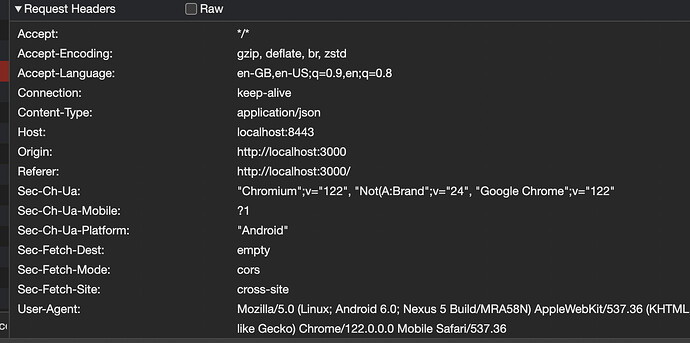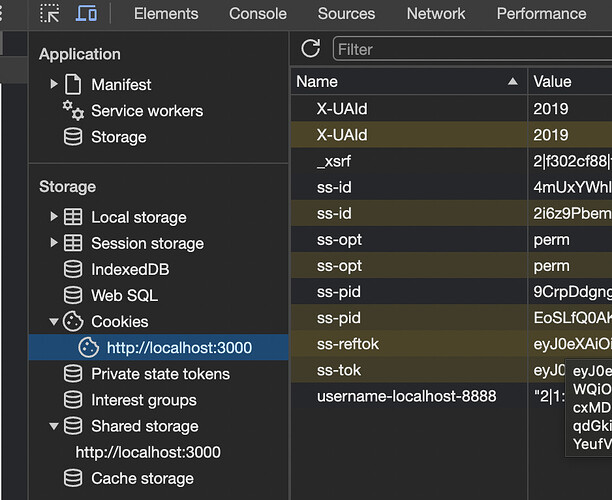in this case its https://localhost:8443 for the api and http://localhost:3000 for the client.
Raw response headers from Authenticate:
HTTP/1.1 200 OK
Content-Type: application/json; charset=utf-8
Date: Wed, 20 Mar 2024 22:06:36 GMT
Server: Kestrel
Access-Control-Allow-Credentials: true
Access-Control-Allow-Headers: Content-Type,enctype,filename,Authorization
Access-Control-Allow-Methods: GET, POST, PUT, DELETE, OPTIONS,PATCH
Access-Control-Allow-Origin: http://localhost:3000
Access-Control-Max-Age: 600
Set-Cookie: ss-id=1t0dYbx7cws4vqwBPXs9; path=/; secure; samesite=lax; httponly
Set-Cookie: ss-pid=zcBlgdK3WqbcPIXyaxud; expires=Sun, 20 Mar 2044 22:06:36 GMT; path=/; secure; samesite=lax; httponly
Set-Cookie: ss-opt=temp; expires=Sun, 20 Mar 2044 22:06:36 GMT; path=/; secure; samesite=lax; httponly
Set-Cookie: X-UAId=2019; expires=Sun, 20 Mar 2044 22:06:36 GMT; path=/; secure; samesite=lax; httponly
Set-Cookie: ss-tok=exxxxOTcsImVtYWlsIjoiYWRtaW5AYWRtaW4uY29tIiwicHJlZmVycmVkX3VzZXJuYW1lIjoiYWRtaW5AYWRtaW4uY29tIiwicm9sZXMiOlsiQWRtaW4iLCJNZW1iZXIiXSwianRpIjoxfQ.yjFt_6yOCdSPyO0bdfhHK3MzzYi0UE71_WUI5MxCZgM; expires=Wed, 03 Apr 2024 22:06:37 GMT; path=/; secure; samesite=lax; httponly
Set-Cookie: ss-reftok=xxxxxx; expires=Thu, 20 Mar 2025 22:06:37 GMT; path=/; secure; samesite=lax; httponly
Transfer-Encoding: chunked
Vary: Accept
X-Powered-By: ServiceStack/8.22 NET6/macOS/net6/IN
X-Cookies: ss-tok,ss-reftok
Auth Response:
{
"userId": "2019",
"sessionId": "xxxxx",
"userName": "admin@admin.com",
"displayName": "",
"profileUrl": "data:image/svg+xml,%3Csvg width='100' height='100' viewBox='0 0 100 100' xmlns='http://www.w3.org/2000/svg'%3E%3Cstyle%3E .path%7B%7D %3C/style%3E%3Cg id='male-svg'%3E%3Cpath fill='%23556080' d='M1 92.84V84.14C1 84.14 2.38 78.81 8.81 77.16C8.81 77.16 19.16 73.37 27.26 69.85C31.46 68.02 32.36 66.93 36.59 65.06C36.59 65.06 37.03 62.9 36.87 61.6H40.18C40.18 61.6 40.93 62.05 40.18 56.94C40.18 56.94 35.63 55.78 35.45 47.66C35.45 47.66 32.41 48.68 32.22 43.76C32.1 40.42 29.52 37.52 33.23 35.12L31.35 30.02C31.35 30.02 28.08 9.51 38.95 12.54C34.36 7.06 64.93 1.59 66.91 18.96C66.91 18.96 68.33 28.35 66.91 34.77C66.91 34.77 71.38 34.25 68.39 42.84C68.39 42.84 66.75 49.01 64.23 47.62C64.23 47.62 64.65 55.43 60.68 56.76C60.68 56.76 60.96 60.92 60.96 61.2L64.74 61.76C64.74 61.76 64.17 65.16 64.84 65.54C64.84 65.54 69.32 68.61 74.66 69.98C84.96 72.62 97.96 77.16 97.96 81.13C97.96 81.13 99 86.42 99 92.85L1 92.84Z'/%3E%3C/g%3E%3C/svg%3E",
"roles": [
"Admin",
"x",
"x",
"x",
"x"
],
"permissions": []
}
Next api call, this is the OPTIONS cors call response headers:
HTTP/1.1 200 OK
Content-Length: 0
Date: Wed, 20 Mar 2024 22:06:39 GMT
Server: Kestrel
Access-Control-Allow-Credentials: true
Access-Control-Allow-Headers: Content-Type,enctype,filename,Authorization
Access-Control-Allow-Methods: GET, POST, PUT, DELETE, OPTIONS,PATCH
Access-Control-Allow-Origin: http://localhost:3000
Access-Control-Max-Age: 600
Vary: Accept
X-Powered-By: ServiceStack/8.22 NET6/macOS/net6/IN
And the request and response headers for the POST:
POST /json/reply/getmemberjobHistReq HTTP/1.1
Accept: */*
Accept-Encoding: gzip, deflate, br, zstd
Accept-Language: en-GB,en-US;q=0.9,en;q=0.8
Connection: keep-alive
Content-Length: 2
Host: localhost:8443
Origin: http://localhost:3000
Referer: http://localhost:3000/
Sec-Fetch-Dest: empty
Sec-Fetch-Mode: cors
Sec-Fetch-Site: cross-site
User-Agent: Mozilla/5.0 (Linux; Android 6.0; Nexus 5 Build/MRA58N) AppleWebKit/537.36 (KHTML, like Gecko) Chrome/122.0.0.0 Mobile Safari/537.36
content-type: application/json
sec-ch-ua: "Chromium";v="122", "Not(A:Brand";v="24", "Google Chrome";v="122"
sec-ch-ua-mobile: ?1
sec-ch-ua-platform: "Android"
HTTP/1.1 401 Unauthorized
Content-Length: 0
Date: Wed, 20 Mar 2024 22:06:39 GMT
Server: Kestrel
Access-Control-Allow-Credentials: true
Access-Control-Allow-Headers: Content-Type,enctype,filename,Authorization
Access-Control-Allow-Methods: GET, POST, PUT, DELETE, OPTIONS,PATCH
Access-Control-Allow-Origin: http://localhost:3000
Access-Control-Max-Age: 600
Set-Cookie: ss-pid=xHRbtz7lhPsPty2jt0ap; expires=Sun, 20 Mar 2044 22:06:36 GMT; path=/; secure; samesite=lax; httponly
Set-Cookie: ss-id=dbJO6wp3SHQHRe3qwalV; path=/; secure; samesite=lax; httponly
Vary: Accept
WWW-Authenticate: credentials realm="/auth/credentials"
X-Powered-By: ServiceStack/8.22 NET6/macOS/net6/IN




